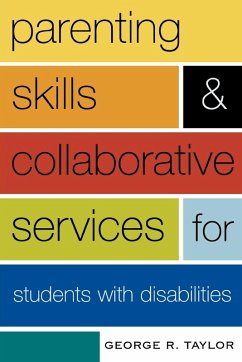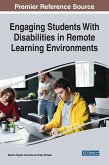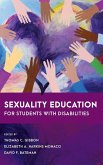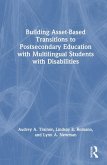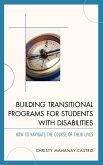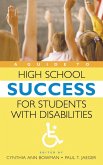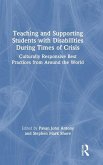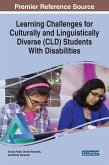George R. Taylor
Parenting Skills and Collaborative Services for Students with Disabilities
George R. Taylor
Parenting Skills and Collaborative Services for Students with Disabilities
- Broschiertes Buch
- Merkliste
- Auf die Merkliste
- Bewerten Bewerten
- Teilen
- Produkt teilen
- Produkterinnerung
- Produkterinnerung
Outlines specific strategies for school personnel, parents, and community agencies to use in providing services for disabled children.
Andere Kunden interessierten sich auch für
![Engaging Students With Disabilities in Remote Learning Environments Engaging Students With Disabilities in Remote Learning Environments]() Engaging Students With Disabilities in Remote Learning Environments225,99 €
Engaging Students With Disabilities in Remote Learning Environments225,99 €![Sexuality Education for Students with Disabilities Sexuality Education for Students with Disabilities]() Sexuality Education for Students with Disabilities112,99 €
Sexuality Education for Students with Disabilities112,99 €![Building Asset-Based Transitions to Postsecondary Education with Multilingual Students with Disabilities Building Asset-Based Transitions to Postsecondary Education with Multilingual Students with Disabilities]() Audrey A TrainorBuilding Asset-Based Transitions to Postsecondary Education with Multilingual Students with Disabilities200,99 €
Audrey A TrainorBuilding Asset-Based Transitions to Postsecondary Education with Multilingual Students with Disabilities200,99 €![Building Transitional Programs for Students with Disabilities Building Transitional Programs for Students with Disabilities]() Christy Mahanay-CastroBuilding Transitional Programs for Students with Disabilities87,99 €
Christy Mahanay-CastroBuilding Transitional Programs for Students with Disabilities87,99 €![A Guide to High School Success for Students with Disabilities A Guide to High School Success for Students with Disabilities]() A Guide to High School Success for Students with Disabilities66,99 €
A Guide to High School Success for Students with Disabilities66,99 €![Teaching and Supporting Students with Disabilities During Times of Crisis Teaching and Supporting Students with Disabilities During Times of Crisis]() Teaching and Supporting Students with Disabilities During Times of Crisis199,99 €
Teaching and Supporting Students with Disabilities During Times of Crisis199,99 €![Learning Challenges for Culturally and Linguistically Diverse (CLD) Students With Disabilities Learning Challenges for Culturally and Linguistically Diverse (CLD) Students With Disabilities]() Soraya FallahLearning Challenges for Culturally and Linguistically Diverse (CLD) Students With Disabilities227,99 €
Soraya FallahLearning Challenges for Culturally and Linguistically Diverse (CLD) Students With Disabilities227,99 €-
-
-
Outlines specific strategies for school personnel, parents, and community agencies to use in providing services for disabled children.
Hinweis: Dieser Artikel kann nur an eine deutsche Lieferadresse ausgeliefert werden.
Hinweis: Dieser Artikel kann nur an eine deutsche Lieferadresse ausgeliefert werden.
Produktdetails
- Produktdetails
- Verlag: Scarecrow Education
- Seitenzahl: 302
- Erscheinungstermin: 9. Dezember 2004
- Englisch
- Abmessung: 229mm x 152mm x 18mm
- Gewicht: 474g
- ISBN-13: 9781578861699
- ISBN-10: 1578861691
- Artikelnr.: 13954141
- Herstellerkennzeichnung
- Libri GmbH
- Europaallee 1
- 36244 Bad Hersfeld
- gpsr@libri.de
- Verlag: Scarecrow Education
- Seitenzahl: 302
- Erscheinungstermin: 9. Dezember 2004
- Englisch
- Abmessung: 229mm x 152mm x 18mm
- Gewicht: 474g
- ISBN-13: 9781578861699
- ISBN-10: 1578861691
- Artikelnr.: 13954141
- Herstellerkennzeichnung
- Libri GmbH
- Europaallee 1
- 36244 Bad Hersfeld
- gpsr@libri.de
By George R. Taylor
Part 1 List of Tables Part 2 Preface Part 3 Acknowledgments Chapter 4 1. A
Systems Perspective of Human Development Chapter 5 2. Parenting Skills
Chapter 6 3. Parental Reactions Chapter 7 4. Counseling Parents Chapter 8
5. Impact of Federal Legislation on Parental Involvement Chapter 9 6.
Techniques for Improving Parental Involvement Chapter 10 7. Promoting
Cultural Awareness Chapter 11 8. Sharing Information Chapter 12 9.
Reporting Progress to Parents Chapter 13 10. Strategies for Improving
Collaboration between Parents and the School Chapter 14 11. Parents'
Perceptions of Placement: Inclusion or Special Education Chapter 15 12.
School and Community Interactions Chapter 16 13. Conclusions and
Implications Part 17 Appendices Chapter 18 A. Information Sources for
Siblings Chapter 19 B. Intervention and Treatment Approaches Chapter 20 C.
Overview of Individuals with Disabilities Education Act (IDEA) Amendments
of 1997 Chapter 21 D. The Individuals with Disabilities Education Act
(IDEA) Amendments of 1997 Chapter 22 E. Readings on the IDEA Amendments of
1997 Chapter 23 F. No Child Left Behind Act Chapter 24 G. Parent Due
Process Checklist Chapter 25 H. The Manifestation Determination Review: Was
the Child's Behavior a Manifestation of His or Her Disability? Chapter 26
I. Abstracts: A Guide for Spanish Parents Relevant to IDEA Chapter 27 J.
Interest Survey-Parent Workshops Chapter 28 K. Resources for Parents
Chapter 29 L. A Team Approach to Diagnosing and Evaluating Children with
Disabilities Part 30 Glossary Part 31 Bibliography Part 32 Author Index
Part 33 Subject Index Part 34 About the Author
Systems Perspective of Human Development Chapter 5 2. Parenting Skills
Chapter 6 3. Parental Reactions Chapter 7 4. Counseling Parents Chapter 8
5. Impact of Federal Legislation on Parental Involvement Chapter 9 6.
Techniques for Improving Parental Involvement Chapter 10 7. Promoting
Cultural Awareness Chapter 11 8. Sharing Information Chapter 12 9.
Reporting Progress to Parents Chapter 13 10. Strategies for Improving
Collaboration between Parents and the School Chapter 14 11. Parents'
Perceptions of Placement: Inclusion or Special Education Chapter 15 12.
School and Community Interactions Chapter 16 13. Conclusions and
Implications Part 17 Appendices Chapter 18 A. Information Sources for
Siblings Chapter 19 B. Intervention and Treatment Approaches Chapter 20 C.
Overview of Individuals with Disabilities Education Act (IDEA) Amendments
of 1997 Chapter 21 D. The Individuals with Disabilities Education Act
(IDEA) Amendments of 1997 Chapter 22 E. Readings on the IDEA Amendments of
1997 Chapter 23 F. No Child Left Behind Act Chapter 24 G. Parent Due
Process Checklist Chapter 25 H. The Manifestation Determination Review: Was
the Child's Behavior a Manifestation of His or Her Disability? Chapter 26
I. Abstracts: A Guide for Spanish Parents Relevant to IDEA Chapter 27 J.
Interest Survey-Parent Workshops Chapter 28 K. Resources for Parents
Chapter 29 L. A Team Approach to Diagnosing and Evaluating Children with
Disabilities Part 30 Glossary Part 31 Bibliography Part 32 Author Index
Part 33 Subject Index Part 34 About the Author
Part 1 List of Tables Part 2 Preface Part 3 Acknowledgments Chapter 4 1. A
Systems Perspective of Human Development Chapter 5 2. Parenting Skills
Chapter 6 3. Parental Reactions Chapter 7 4. Counseling Parents Chapter 8
5. Impact of Federal Legislation on Parental Involvement Chapter 9 6.
Techniques for Improving Parental Involvement Chapter 10 7. Promoting
Cultural Awareness Chapter 11 8. Sharing Information Chapter 12 9.
Reporting Progress to Parents Chapter 13 10. Strategies for Improving
Collaboration between Parents and the School Chapter 14 11. Parents'
Perceptions of Placement: Inclusion or Special Education Chapter 15 12.
School and Community Interactions Chapter 16 13. Conclusions and
Implications Part 17 Appendices Chapter 18 A. Information Sources for
Siblings Chapter 19 B. Intervention and Treatment Approaches Chapter 20 C.
Overview of Individuals with Disabilities Education Act (IDEA) Amendments
of 1997 Chapter 21 D. The Individuals with Disabilities Education Act
(IDEA) Amendments of 1997 Chapter 22 E. Readings on the IDEA Amendments of
1997 Chapter 23 F. No Child Left Behind Act Chapter 24 G. Parent Due
Process Checklist Chapter 25 H. The Manifestation Determination Review: Was
the Child's Behavior a Manifestation of His or Her Disability? Chapter 26
I. Abstracts: A Guide for Spanish Parents Relevant to IDEA Chapter 27 J.
Interest Survey-Parent Workshops Chapter 28 K. Resources for Parents
Chapter 29 L. A Team Approach to Diagnosing and Evaluating Children with
Disabilities Part 30 Glossary Part 31 Bibliography Part 32 Author Index
Part 33 Subject Index Part 34 About the Author
Systems Perspective of Human Development Chapter 5 2. Parenting Skills
Chapter 6 3. Parental Reactions Chapter 7 4. Counseling Parents Chapter 8
5. Impact of Federal Legislation on Parental Involvement Chapter 9 6.
Techniques for Improving Parental Involvement Chapter 10 7. Promoting
Cultural Awareness Chapter 11 8. Sharing Information Chapter 12 9.
Reporting Progress to Parents Chapter 13 10. Strategies for Improving
Collaboration between Parents and the School Chapter 14 11. Parents'
Perceptions of Placement: Inclusion or Special Education Chapter 15 12.
School and Community Interactions Chapter 16 13. Conclusions and
Implications Part 17 Appendices Chapter 18 A. Information Sources for
Siblings Chapter 19 B. Intervention and Treatment Approaches Chapter 20 C.
Overview of Individuals with Disabilities Education Act (IDEA) Amendments
of 1997 Chapter 21 D. The Individuals with Disabilities Education Act
(IDEA) Amendments of 1997 Chapter 22 E. Readings on the IDEA Amendments of
1997 Chapter 23 F. No Child Left Behind Act Chapter 24 G. Parent Due
Process Checklist Chapter 25 H. The Manifestation Determination Review: Was
the Child's Behavior a Manifestation of His or Her Disability? Chapter 26
I. Abstracts: A Guide for Spanish Parents Relevant to IDEA Chapter 27 J.
Interest Survey-Parent Workshops Chapter 28 K. Resources for Parents
Chapter 29 L. A Team Approach to Diagnosing and Evaluating Children with
Disabilities Part 30 Glossary Part 31 Bibliography Part 32 Author Index
Part 33 Subject Index Part 34 About the Author

